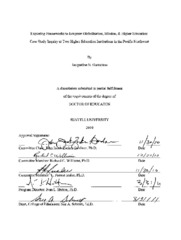| dc.description.abstract | The purpose of this study was to explore the merits of three conceptual frameworks that emerged from a synthesis of literature related to globalization, mission, and higher education. The first framework, higher education & mission, included three frames: important, not important, and emergent. The second framework, globalization & higher education, included four frames: accommodation, resistance, combination of accommodation and resistance, and proposed response. The third framework, globalization & mission, was built upon leadership theory; the transcendent leadership model served as the cornerstone of this framework. Specifically, the exploration of the three conceptual frameworks was conducted at two private mission-driven higher education institutions located in the Pacific Northwest. In this qualitative multiple-case study, the researcher employed interviews, focus groups, and documents and archival records as three sources of evidence. Faculty, staff, and students were among those interviewed at each higher education institution. Data were transcribed, coded, and triangulated between sources. As related to the purpose of the study, the researcher’s aim was to use the three frameworks (higher education & mission, globalization & higher education, and globalization & mission) to explore the nexus of the relationship between globalization, mission, and higher education at the two institutions studied. The research question was: What is the relationship between higher education institutions, their mission statements, and globalization and how does one inform the other? Six additional guiding research questions were included in order to provide specific areas of foci. The results of this initial exploratory study included three interrelated findings. First, it appeared that there was a relationship between globalization, mission, and higher education at each of the two institutions studied. Second, it was found that the three conceptual frameworks, developed to integrate globalization, mission, and higher education at the two institutions studied, had merit. Third, it was found that the methodology for exploring the three conceptual frameworks, to integrate globalization, mission, and higher education, had merit. In the end, the researcher, working from an advocacy/participatory worldview, asserted that higher education institutions should work toward building a strong foundation for transformed education; committed to addressing the needs of an interrelated and interdependent global community. | en |


 Maintained by the Northwest University Library
Maintained by the Northwest University Library